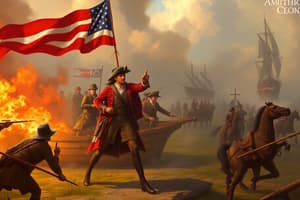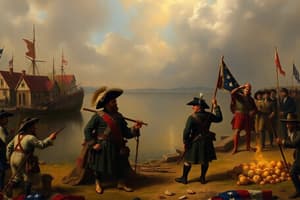Podcast
Questions and Answers
What was one advantage the Americans had at the start of the Revolutionary War?
What was one advantage the Americans had at the start of the Revolutionary War?
- They had better-trained soldiers.
- They had a larger army than the British.
- They were familiar with the land. (correct)
- They received significant funding from Europe.
Which factor contributed to the British underestimating the American forces?
Which factor contributed to the British underestimating the American forces?
- The British enjoyed superior alliances.
- The British were confident in their military strength. (correct)
- The Americans had more soldiers.
- The Americans had better equipping.
What was a major disadvantage for the American forces?
What was a major disadvantage for the American forces?
- They faced significant disorganization. (correct)
- They were trained by experienced commanders.
- They had the support of Spain.
- They had access to ample resources.
How did George Washington contribute to the American victory in the Revolutionary War?
How did George Washington contribute to the American victory in the Revolutionary War?
What impact did the French alliance have on the American Revolution?
What impact did the French alliance have on the American Revolution?
What role did Baron von Steuben play during the Revolutionary War?
What role did Baron von Steuben play during the Revolutionary War?
Which statement best describes the motivation of the British forces in the Revolutionary War?
Which statement best describes the motivation of the British forces in the Revolutionary War?
Which battle is recognized for being a turning point in the Revolutionary War for the Americans?
Which battle is recognized for being a turning point in the Revolutionary War for the Americans?
Flashcards
Motivation for American Revolution
Motivation for American Revolution
The American colonists fought for their freedom, independence, and a way of life free from British control.
American Strategy in Revolution
American Strategy in Revolution
The colonists used guerilla tactics, fortifications, and surrounded British troops, like at Saratoga, to outsmart the stronger British army.
Leadership in American Revolution
Leadership in American Revolution
Strong leadership from figures like George Washington, Baron von Steuben, and John Paul Jones helped motivate, train, and inspire the American soldiers.
Alliances in American Revolution
Alliances in American Revolution
Signup and view all the flashcards
What does 'desert' mean in the Revolutionary War?
What does 'desert' mean in the Revolutionary War?
Signup and view all the flashcards
What is an 'alliance'?
What is an 'alliance'?
Signup and view all the flashcards
Advantages of American Colonists
Advantages of American Colonists
Signup and view all the flashcards
Advantages of the British
Advantages of the British
Signup and view all the flashcards
Study Notes
Revolutionary War Odds and Positions
- American Advantages: Defensive position, familiarity with the land, distance of Britain from home, British underestimation of American capabilities, fighting for their homes and freedom.
- American Disadvantages: Smaller, less well-funded military compared to Britain, disorganized, unprepared, lack of formal training, insufficient troops and difficulty recruiting, initial lack of resources.
- British Advantages: Strongest military in the world, access to mercenaries (hired soldiers), larger army
- British Disadvantages: Distance from home base, underestimate American resolve and knowledge of the terrain, were trying to control a large area.
American Victory Factors
- Motivation: Colonists fought for freedom, independence, and their way of life. Contrast this to mercenary motivation (money) and British motivation (control).
- Strategy: Americans employed guerilla warfare tactics, used their knowledge of the land to their advantage, built fortifications, and surrounded British troops—a crucial factor in the Battle of Saratoga and the eventual end of the war in Yorktown.
- Leadership: George Washington's leadership motivated the troops, shared hardships and boosted morale, recruited experts like Baron von Steuben to train the army, instill motivation and military technique. Von Steuben’s training and discipline of troops was critical. John Paul Jones displayed exemplary leadership, determination, strategic thinking, and heroism.
- Alliances: France and Spain provided crucial financial, material, and naval support, diverting British resources and military attention to multiple fronts. Spain’s contribution included defending forts and aiding in battle for Florida. The Marquis de Lafayette was vital as a general.
Revolutionary War Vocabulary
- Desert: To abandon one's duty or post without permission.
- Alliance: A formal agreement between two or more countries to cooperate militarily.
- Mercenary: A professional soldier hired to fight for a foreign country or cause.
- Republic: A form of government in which citizens vote for representatives who create and enact laws.
- Privateer: A privately owned armed ship authorized by a government to attack enemy ships during wartime.
Studying That Suits You
Use AI to generate personalized quizzes and flashcards to suit your learning preferences.




